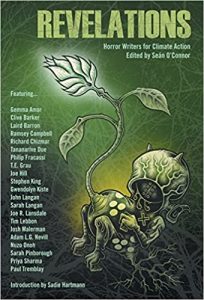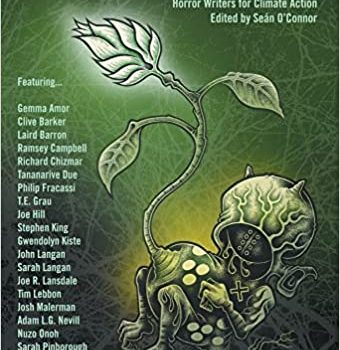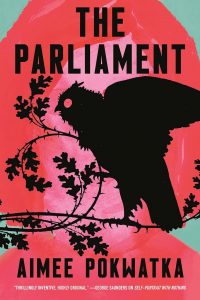Maya C. James Reviews Revelations: Horror Writers for Climate Action by Seán O’Connor, ed.
 Revelations: Horror Writers for Climate Action. Seán O’Connor, ed. (Stygian Sky Media 978-1639510054, $40.00, 344pp, hc) April 2022.
Revelations: Horror Writers for Climate Action. Seán O’Connor, ed. (Stygian Sky Media 978-1639510054, $40.00, 344pp, hc) April 2022.
Revelations: Horror Writers for Climate Action begins with the charred landscape of a California wildfire. Writing of her family’s vacations in northern California, and her more recent experiences with its intensifying fires, horror reviewer Sadie Hartmann offers a focused and passionate introduction to the anthology: climate change is real, it is affecting all of us, and these horror writers intend to do something about it.
Revelations: Horror Writers for Climate Action is a horror anthology featuring 22 stories by renowned writers of the genre. Edited by Seán O’Connor, the anthology features a wide array of authors and subgenres, including supernatural horror, body horror, apocalyptic fiction, Lovecraftian fiction, dark fantasy, among others. With climate change as the theme for a horror anthology, it seems it would be easy for it to become overly nihilistic (and frankly too depressing, considering its real-world impacts), but O’Connor has done a wonderful job selecting a blend of light and sinister tales. Stephen King’s ‘‘Summer Thunder’’ is a standout in this regard, blending the day-to-day relationships of a small New England town’s occupants with the slow-burning horror of radioactive poisoning. ‘‘Carriers’’ by Tananarive Due focuses on a society’s progression following a plague, while also offering a glimpse into camaraderie and relationships following disaster. These stories do not just focus on the environmental impact of climate change, but on the potential for reconciliation, hope, and looming societal and personal despair following Earth’s destruction.
I certainly enjoyed some tales over others. The strongest stories in Revelations: Horror Writers for Climate Action feature relatable characters shaped both by their environment and the greed of those around them, whereas the noticeably weaker stories in the collection have quite unimaginative characters managing their own downfall. Although there is a wide array of subgenres, Lovecraftian horror tales seemed overrepresented. I am admittedly not keen to read Lovecraftian retellings, but found these to be weaker because of how repetitive they felt. Stories set in Western Europe and America also felt overrepresented. While there were some welcome exceptions and standouts, it seemed like a missed opportunity to delve into climate change’s impact on the parts of the world that bears the brunt of it most intensely. Notably, Nuzo Onoh’s ‘‘Black Queen’’ offered some pointed observations of neocolonialism and universal human greed, in addition to its Nigerian cli-fi plot.
I also enjoyed the stories with a touch of dark humor: Clive Barker’s ‘‘The Wood on the Hill’’ is a fable-like tale of a vain duchess who begins cutting down an old, vengeful forest. The tongue-in-cheek ending is a thing made of nightmares, and I quite enjoyed the author’s note at the end. Similarly, ‘‘Jude Confronts Global Warming’’ by Joe Hill and ‘‘Black Queen’’ by Onoh feature characters receiving their comeuppance for harming the Earth, though I would not categorize ‘‘Black Queen’’ as dark humor. My two favorite stories were ‘‘Low-Hanging Clouds’’ by T.E. Grau and ‘‘Fields of Ice’’ by Gemma Amor. ‘‘Low Hanging Clouds’’ was among the shortest stories here, and certainly the most unsettling – its conciseness left me uneasy in an impressive way. ‘‘Fields of Ice’’ was a master class in atmospheric writing and horror. True to its name, the story is sharp not only in its icy landscape, but through main protagonist Hayder’s intelligence, the casual cruelty of the antagonists, and the brutal violence that ensues. ‘‘The Maid from the Ash: A Life in Pictures’’ by Gwendolyn Kiste has the most innovative storytelling approach in the book. Akin to a found-footage film, Kiste guides readers through a second-person photo gallery tour – a series of nightmarish pictures that catalogue a mysterious young woman’s journey back to a dilapidated hut.
Revelations: Horror Writers for Climate Action is about anticipation: whether of ghastly creatures emerging from thawing ice, pandemics, or impending floods, the collection imbues a sense of foreboding and glimpses of human spirit in the face of certain destruction. All proceeds of the collection go to climateoutreach.org.
Maya C. James is a graduate of the Lannan Fellows Program at Georgetown University, and full-time student at Harvard Divinity School. Her work has appeared in Star*Line, Strange Horizons, FIYAH, Soar: For Harriet, and Georgetown University’s Berkley Center Blog, among others. She was recently long listed for the Stockholm Writers Festival First Pages Prize (2019), and featured on a feminist speculative poetry panel at the 2019 CD Wright Women Writer’s Conference. Her work focuses primarily on Afrofuturism, and imagining sustainable futures for at-risk communities. You can find more of her work here, and follow her on Twitter: @mayawritesgood.
This review and more like it in the January 2023 issue of Locus.
 While you are here, please take a moment to support Locus with a one-time or recurring donation. We rely on reader donations to keep the magazine and site going, and would like to keep the site paywall free, but WE NEED YOUR FINANCIAL SUPPORT to continue quality coverage of the science fiction and fantasy field.
While you are here, please take a moment to support Locus with a one-time or recurring donation. We rely on reader donations to keep the magazine and site going, and would like to keep the site paywall free, but WE NEED YOUR FINANCIAL SUPPORT to continue quality coverage of the science fiction and fantasy field.
©Locus Magazine. Copyrighted material may not be republished without permission of LSFF.








